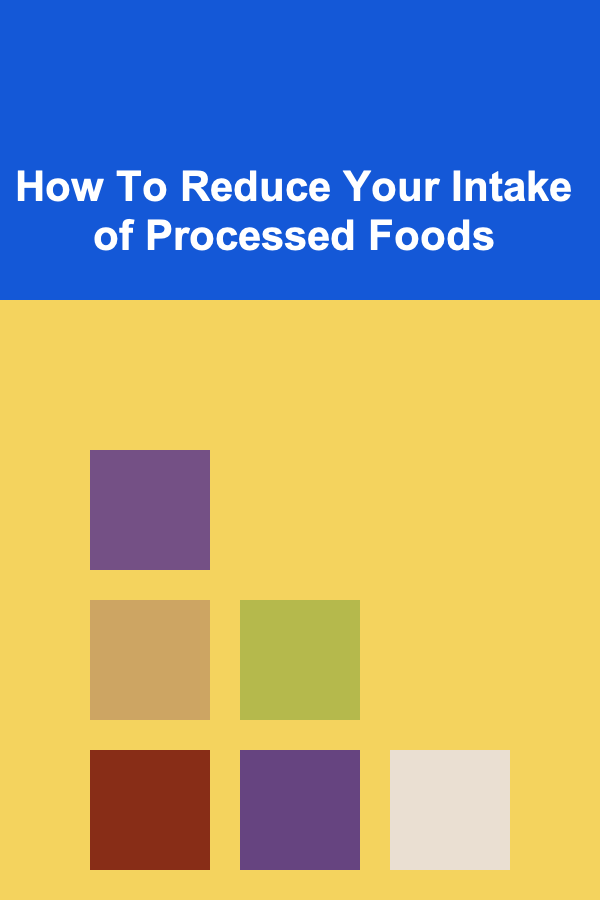
How To Reduce Your Intake of Processed Foods
ebook include PDF & Audio bundle (Micro Guide)
$12.99$5.99
Limited Time Offer! Order within the next:

Processed foods are a cornerstone of modern diets. From ready-made meals and packaged snacks to fast food chains, processed foods have become ubiquitous in the modern world. However, consuming too much processed food can have serious health consequences. These include increased risks of chronic diseases such as obesity, diabetes, and heart disease, as well as poor nutrition and potential long-term effects on mental health. Therefore, reducing your intake of processed foods is essential for improving overall health and wellness. This article will explore why processed foods are harmful, the benefits of cutting back on them, and practical strategies to help you reduce processed food consumption without feeling deprived.
Understanding Processed Foods
Before we discuss how to reduce your intake of processed foods, it is important to define what "processed" means. In the simplest terms, processing refers to the methods used to preserve, package, or change food from its natural state. These processes can range from simple actions such as freezing fruits and vegetables to more complex methods involving additives, preservatives, and artificial flavors.
Processed foods can generally be categorized into the following types:
- Minimally Processed Foods: These foods have undergone little processing and still retain their natural nutrients. Examples include bagged salads, frozen vegetables, or whole grain pasta.
- Moderately Processed Foods: These foods are altered to some extent but still retain most of their nutritional value. Examples include canned vegetables, canned beans, or yogurt with added flavors.
- Heavily Processed Foods: These are foods that have undergone significant alterations and typically contain added sugars, artificial ingredients, preservatives, and unhealthy fats. Examples include chips, cookies, sodas, and pre-packaged meals.
- Ultra-Processed Foods: These are the most processed foods, containing few if any whole ingredients. They often contain artificial flavorings, preservatives, colors, and sweeteners. Examples include fast food, packaged snacks, instant noodles, and ready-to-eat meals.
While not all processed foods are harmful, it is the heavily and ultra-processed foods that pose the greatest health risks. The excessive use of added sugars, sodium, unhealthy fats, and artificial ingredients in these foods has been linked to a variety of health issues.
The Dangers of Processed Foods
There are several reasons why processed foods can be harmful to health:
1. High in Unhealthy Fats
Processed foods often contain unhealthy fats, particularly trans fats and saturated fats, which can increase the risk of heart disease. These fats are typically found in baked goods, fried foods, and fast food. Consuming these fats regularly can contribute to clogged arteries, high blood pressure, and heart attacks.
2. Excessive Sugar and Sodium
Many processed foods are high in added sugars and sodium, both of which can have detrimental effects on health. Consuming too much sugar can lead to weight gain, insulin resistance, and an increased risk of type 2 diabetes. High sodium intake can cause high blood pressure, which is a risk factor for heart disease and stroke.
3. Lack of Nutritional Value
Processed foods are often stripped of essential nutrients during their production. For example, refining grains removes fiber, vitamins, and minerals. As a result, these foods are often calorie-dense but nutrient-poor, leading to an imbalance in your diet. Over time, a diet dominated by processed foods can lead to nutrient deficiencies and poor overall health.
4. Artificial Additives
Many ultra-processed foods contain artificial ingredients such as flavorings, colorants, and preservatives. These additives have been linked to various health issues, including allergies, digestive problems, and even behavioral issues in children. Some artificial additives, such as artificial sweeteners, have also been associated with an increased risk of metabolic disorders.
5. Risk of Obesity
Processed foods are often highly palatable, meaning they are designed to be delicious and easy to overeat. This can lead to overeating and contribute to weight gain. Additionally, the high sugar and fat content of these foods can cause blood sugar spikes and crashes, leading to cravings and more overeating. The combination of overeating and low nutritional value makes it easier to gain weight and harder to lose it.
6. Mental Health Impacts
Recent studies have also linked the consumption of highly processed foods to poor mental health. Diets high in processed foods have been associated with increased risks of depression, anxiety, and cognitive decline. Nutrient-poor diets can negatively affect brain health by depriving the body of essential nutrients required for proper brain function.
Benefits of Reducing Processed Foods
Cutting back on processed foods can have a profound impact on your overall health and well-being. Here are some key benefits:
1. Better Heart Health
By reducing processed foods, you will naturally lower your intake of unhealthy fats, sugar, and sodium, all of which contribute to heart disease. A diet rich in whole foods like fruits, vegetables, whole grains, and lean proteins can help reduce your cholesterol levels, lower blood pressure, and decrease inflammation, promoting heart health.
2. Improved Weight Management
Processed foods tend to be calorie-dense but nutrient-poor. By eating whole, unprocessed foods, you will feel fuller for longer on fewer calories, making it easier to maintain a healthy weight. Whole foods also provide essential nutrients that help regulate metabolism and support healthy digestion.
3. Better Digestion
Whole foods like fruits, vegetables, and whole grains are rich in fiber, which is essential for good digestion. Fiber promotes regular bowel movements, prevents constipation, and supports a healthy gut microbiome. In contrast, processed foods often lack fiber and can lead to digestive issues such as bloating and constipation.
4. Increased Energy Levels
A diet based on whole, unprocessed foods provides a steady stream of nutrients and energy without the crashes often associated with processed foods. By avoiding sugar-laden snacks and refined carbs, you can maintain stable blood sugar levels throughout the day, leading to sustained energy levels and improved mood.
5. Mental Clarity
Consuming nutrient-dense whole foods can support brain health, leading to better mental clarity and cognitive function. On the other hand, processed foods high in refined sugars and unhealthy fats can negatively affect brain function, leading to mood swings, brain fog, and difficulty concentrating.
6. Reduced Inflammation
Chronic inflammation is a key factor in the development of many chronic diseases, including heart disease, diabetes, and cancer. Processed foods, especially those high in sugar, unhealthy fats, and preservatives, can trigger inflammation in the body. By switching to whole foods, you can reduce inflammation and lower your risk of developing these diseases.
How To Reduce Your Intake of Processed Foods
Reducing your intake of processed foods doesn't have to be difficult or restrictive. Here are some practical strategies to help you make the transition to a healthier, whole-foods-based diet:
1. Cook More at Home
Cooking at home gives you complete control over the ingredients you use. This makes it easier to avoid processed foods and incorporate more whole, fresh ingredients into your meals. By cooking meals from scratch, you can experiment with healthier ingredients and flavors, ensuring that you and your family are getting the nutrients you need.
2. Plan Your Meals
Meal planning is an effective way to avoid reaching for processed convenience foods. Plan your meals ahead of time, create a shopping list, and stick to it. By planning your meals, you can make sure you have healthy options readily available and avoid the temptation to opt for unhealthy processed foods.
3. Shop the Perimeter of the Store
Most supermarkets place whole, unprocessed foods like fruits, vegetables, meats, and dairy along the perimeter of the store. Processed foods are typically found in the center aisles. When shopping, try to focus on the outer aisles where you'll find the freshest ingredients. Limit your time in the processed food aisles to avoid temptation.
4. Choose Whole Grains Over Refined Grains
When it comes to grains, opt for whole grains like brown rice, quinoa, oats, and whole wheat bread. These are far more nutritious than their refined counterparts (e.g., white rice or white bread), as they contain more fiber, vitamins, and minerals. Whole grains are also more filling, which can help with portion control and weight management.
5. Read Labels
Processed foods often contain added sugars, unhealthy fats, and artificial additives. When purchasing packaged foods, take the time to read the ingredient list. Choose products with fewer ingredients, and avoid items that contain artificial sweeteners, preservatives, or trans fats. Familiarize yourself with common names for sugar and unhealthy fats (e.g., high fructose corn syrup, partially hydrogenated oils) to help you make better choices.
6. Incorporate More Plant-Based Foods
Plant-based foods like fruits, vegetables, legumes, nuts, and seeds are packed with nutrients and free from the unhealthy additives found in processed foods. By incorporating more plant-based meals into your diet, you can significantly reduce your intake of processed foods. Try to make vegetables the star of your meals, using them as the base for salads, stir-fries, soups, and stews.
7. Avoid Fast Food
Fast food is one of the most processed types of food you can eat. It is typically high in unhealthy fats, sodium, and sugar. Instead of relying on fast food for convenience, try preparing healthier homemade versions of your favorite fast foods. For example, make your own burgers, wraps, or pizzas using whole, fresh ingredients.
8. Make Healthier Snack Choices
Snacking is another area where processed foods often sneak in. Instead of reaching for chips, cookies, or candy, opt for healthier snacks like fresh fruits, nuts, seeds, or homemade granola bars. These snacks provide essential nutrients and are far more filling than processed alternatives.
9. Hydrate with Water
Sodas and sugary beverages are some of the most processed drinks you can consume. Instead of drinking sugary sodas, try to hydrate with water, herbal teas, or homemade smoothies. You can add lemon, cucumber, or mint to your water for added flavor without the added sugar.
10. Gradually Cut Back
If you're accustomed to eating a lot of processed foods, making a drastic change may feel overwhelming. Instead of cutting out processed foods all at once, start by gradually reducing your intake. Replace one or two processed meals or snacks each week with healthier, whole-food alternatives, and over time, you'll reduce your overall dependence on processed foods.
Conclusion
Reducing your intake of processed foods is an essential step towards better health. By understanding the dangers of processed foods, the benefits of eating whole foods, and the strategies to make the transition, you can take control of your diet and improve your overall well-being. Cooking at home, planning meals, reading labels, and incorporating more whole foods into your diet are all practical ways to cut back on processed foods. The journey toward a healthier diet may take time, but with commitment and small changes, you can enjoy a more balanced and nutritious lifestyle.
Reading More From Our Other Websites
- [Home Space Saving 101] How to Turn Your Closet Into a Functional Storage Space
- [Biking 101] How to Choose the Best Bike Computer for Your Riding Goals
- [Personal Care Tips 101] How to Use Dry Shampoo to Prevent Greasy Roots and Maintain a Fresh Look
- [Organization Tip 101] Step-by-Step Guide to Refurbishing Mid-Century Modern Chairs and Tables
- [Home Lighting 101] How to Brighten Your Bathroom with the Right Lighting
- [Tiny Home Living Tip 101] Best Strategies for Efficient Water Management in Off‑Grid Tiny Living
- [Home Space Saving 101] How to Use Vertical Space for Storage and Organization
- [Personal Care Tips 101] How to Prevent Hair Breakage with the Right Hair Oil
- [Weaving Tip 101] Troubleshooting Common Frame Loom Problems and How to Fix Them
- [Home Space Saving 101] How to Use Under-Sink Storage for Better Bathroom Organization

Growing Your Business Through Strategic B2B Sales: A Comprehensive Guide for Executives
Read More
How to Build an Emergency Fund for Home Repairs and Unexpected Costs
Read More
The Pros and Cons of Using a One-Page Website for Your Business
Read More
How To Understand the Genetics of Human Behavior
Read More
How to Master Double Exposure Photography
Read More
How to Choose the Perfect Sunglasses for Your Face
Read MoreOther Products

Growing Your Business Through Strategic B2B Sales: A Comprehensive Guide for Executives
Read More
How to Build an Emergency Fund for Home Repairs and Unexpected Costs
Read More
The Pros and Cons of Using a One-Page Website for Your Business
Read More
How To Understand the Genetics of Human Behavior
Read More
How to Master Double Exposure Photography
Read More